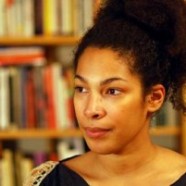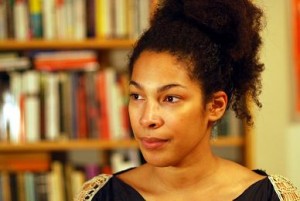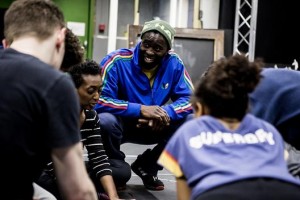Jackie Sibblies Drury at the Bush
Brooklyn-based American playwright Jackie Sibblies Drury draws an audible breath down the phone from the Bush Theatre in west London when I ask her about the differences in discourse about race on stage between the US and the UK. She’s is the middle of teching for the European première of her play (you’ll need an audible breath yourself here), We Are Proud to Present a Presentation About the Herero of Namibia, Formerly Known as Southwest Africa, From the German Sudwestafrika, Between the Years 1884 – 1915. “I think when you talk about race in America, it very quickly becomes a Black vs. white thing that ignores this entire other swath of the population. The Black and white experience each become very uniform and so much of that dynamic is also based in slavery, so it becomes victim/oppressor very quickly.
“It seems discussion of race in Britain becomes so complex immediately; there are so many more ethnicities at play that it has to become a multi-faceted conversation. Class is also so much more of a bigger topic here, it seems like it’s focussed on as being more the source of contention. Race here also seems to be tied into a post-Colonial/Colonial discussion here, so the history of it feels very different even though some of the dynamics are the same as the US.”
We Are Proud… is a play within a play, set around a group of actors attempting to tell the little-known story of the first genocide of the 20th Century. As the official blurb describes it: ‘. As the full force of a horrific past crashes into the good intentions of the present, what seemed a faraway place and time is suddenly all too close to home’.
Jackie modestly bats away my question about feeling any pressure about being a writer ‘of the moment’. “I never think about it, so therefore no. ” It must be hard not to think about it; We Are Proud…had its world première at Victory Gardens. It was a New York Magazine Top 10 Play of 2012, and won acclaim in productions across America, while her CV boats a list of awards and fellowships.
She will admit to being proud of the play, but is at pains to explain that this was no over-night success. “The story of the play came from me wanting to write about this Herero genocide. But I wrote a play that I didn’t think was very good. Once I stopped being a little bit sad about how bad the play was – which took a little while – I tried to think about how I felt about failing at writing that play. I then sent a group of actors down a similar but hopefully more dramatically interesting version of those failures.”
She first learned about the Herero genocide in 2005. “I did some research about it and then put it all in a drawer and forgot about it, but I knew I wanted to write a play about it. A few years later I went to graduate school for playwriting and when it came to thesis time, it seemed like this was to me personally, an important play to write. It seemed like a good thing to be the culmination of my graduate degree. I completed the first Frankenstein, sewn-together iteration of the play as it currently stands in 2010.
“It’s about a group of actors, three of the them black, three white who try to create a piece about the first genocide of the 20th Century, which was committed by the German government in an area in the south of Africa before WW1. As the actors are trying to create this theatre piece, they end up having to deal with the racial dynamics that are in room and contemporary racial and identity politics.
Though she is modest about her own acting abilities (she has a background in performing) much of her writing process was driven by the actors in the room. “I didn’t spend time writing down verbatim things that the actors had said, but I spent a lot of time talking to the specific performers I had; I really wanted to write to their strengths. I was working with a wonderful actress that has a great ear for comedy, so I gave her lots of parts to play that came from things that she was really good at.
“I myself never enjoyed being on stage but I did love all the backstory and the rehearsal, that’s a big part of what I like about writing, though oddly in this play it’s the opposite in that the backstories are not defined at all. The only requirements for each of the characters is that they are relatively young, three are black, three are white, two are female, four are male. There’s none of the ‘you’re from east London and you’re four foot eleven and walk with a limp’ type characterisation. It’s about trying to invite the performers to invest themselves as much as possible in creating those characters…in their own way, to their own strengths.”
The play’s journey is not yet over, with much work going into re-working it for a British Audience. “We have adapted the play for a British audience and yes, it has changed a lot; the play was very much in that Black/white dynamic and very much set in the US but ends up dredging up images of the American South. But the director (Gbolahan Obisesan, returning to the Bush after the 2011 sell-out run of his award-winning play Mad About The Boy) was very confident that we could translate it to something here; put it in the pattern of imagery that comes from contemporary British history.
“The play is going to be much more global than I ever anticipated it being. In some ways, it’s a totally new play here, which is very exciting. Some of the changes have been ‘should we say railroad or railway?’ but other things have been much deeper and broader conversations. The translation process feels incredibly collaborative because I’m not an expert on Britain.”
Having worked through so many changes and now mid-tech, I note that she sounds decidedly cheerier than most writers might at this point. “I’m so excited – tech can be such a hopeful time! I can’t say that everyone that sees it is going to love it, but I do think that it’s going to feel like an event.”
We Are Proud to Present a Presentation About the Herero of Namibia, Formerly Known as Southwest Africa, From the German Sudwestafrika, Between the Years 1884 – 1915, 28th Feb-12th April, Bush Theatre. www.bushtheatre.co.uk









Recent Comments